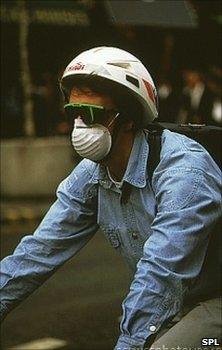Cyclists are 'unaware of the risks from pollution'
- Published
- comments

Many cyclists wear masks to try and minimise the effects of air pollution
Cycling is a great way to get around cities and become fit at the same time - but do cyclists get enough public health information about the damage air pollution could be doing to their lungs?
In this week's Scrubbing Up, Amanda Dryer, based at the infirmary' s Platt Rehabilitation Unit says cyclists need to be given more information about the risks of cycling in polluted areas.
Cycling is fantastic exercise. It yields many health benefits and should not be discouraged due to concerns regarding air pollution.
It is critical however that we raise public awareness about the effects that air pollution has on the respiratory system - both in the short and long term.
At the moment, these effects are not well publicised. Giving cyclists more information would enable them to make informed decisions about when and where they cycle.
Breathing difficulties
Air pollution is made up of numerous pollutants that have been reported to have specific effects on the lungs.
The pollution from diesel engines is of particular concern as the small particulates or ultra fine particles which tend to be emitted by diesel engines, can be inhaled further down into the lungs than the larger particles.
In people with existing respiratory disease this can cause significant airway irritation and breathing difficulties.
Pollution also creates gases - sulphur dioxide, carbon monoxide, nitrogen dioxide and ozone. These gases have been reported as having certain effects on the lungs.
Primarily they can cause the airways to become inflamed and therefore narrow, trigger airway irritation, decrease the amount of oxygen that the blood can carry and reduce lung function.
However, hard evidence on the impact of air pollution on the health of the general population is inconclusive.
Some studies have reported a decline in lung function with airway inflammation, whilst others highlight a very weak tenuous link between air pollution and any effects on the respiratory system.
Several studies have specifically investigated the effects of air pollution on lung function in cyclists.
It has been postulated that because cyclists breathe more deeply during the physical exertion of cycling, that they can inhale up to five times more particulates than either car users or those travelling on public transport.
On the other hand, it has also been suggested that passengers travelling in cars or buses are more at risk of being exposed to higher levels of air pollution than cyclists, as they are sitting in an environment of limited circulating ventilation.
Despite the contradictions, cyclists need to be informed of the potential risks.
It is not unusual for health promotion messages to face contradictions and ambiguities when promoting one measure to benefit health - daily cycling - while potentially increasing the risk of an adverse effect - increased exposure to air pollution.
Minimise risk
In the cycling community, there are many ongoing discussions on different cycling web sites that suggest ways to minimise risk.
These include finding alternative routes away from high density commuter traffic and major public transport routes, avoiding congested roads and utilising cycle paths and tracks and finding routes that offer some shielding from air pollution - eg trees.
Also, don't get stuck behind a bus or find yourself travelling downwind of vehicle's exhaust fumes and when stopping at traffic lights or a major junction, move out in front of the stationary motor vehicles so you are not inhaling the plume of exhaust fumes and by monitoring air quality in your area.
Public health is all about investigating and identifying ways to minimise risk but it's also about common sense. It is important that we consider what measures could be adopted to try and protect cyclists' airway function.
One of the main obstacles to promoting a clear public health message is that there is no clear UK guidance as to what are acceptable levels when we consider air pollution reduction figures - it's too vague.
There needs to be closer scrutiny of air quality in particular, within built up urban areas and a firm commitment to continually investigate and evaluate how we can make our environment cleaner. For example investigating cleaner fuels, better emission controlling devices and supporting car manufacturers in developing new technology to investigate electric vehicles.
There also needs to additional funding resources that reflects the need to improving health and allow further research to be conducted to accurately detail the effects of pollution on the respiratory system and to clarify what are the potential toxic effects of air pollution on the lungs.
The government's ongoing strategy should be how we can continually monitor air quality and ensure that we are achieving reductions in pollutant levels that are clear and laid out.
Monitoring air quality in the UK has not been given enough publicity or funding. As a result, often cyclists do not fully appreciate what risks they are imposing upon themselves by cycling in areas where air quality is sub optimal.
We need to make sure people are given informed choices when it comes to deciding what measures they can adopt to protect themselves against air pollution - this can only come about if clear health promotion is delivered to the public.